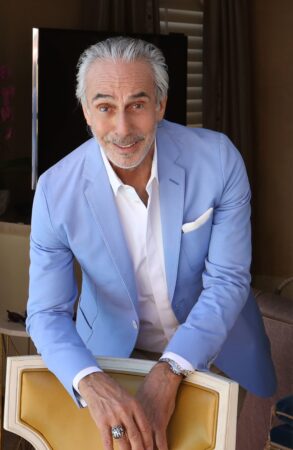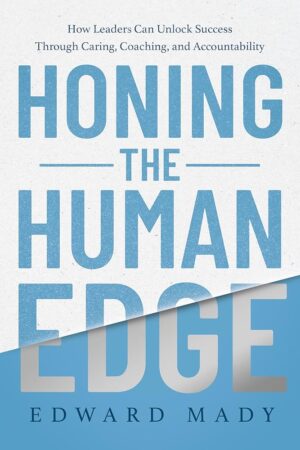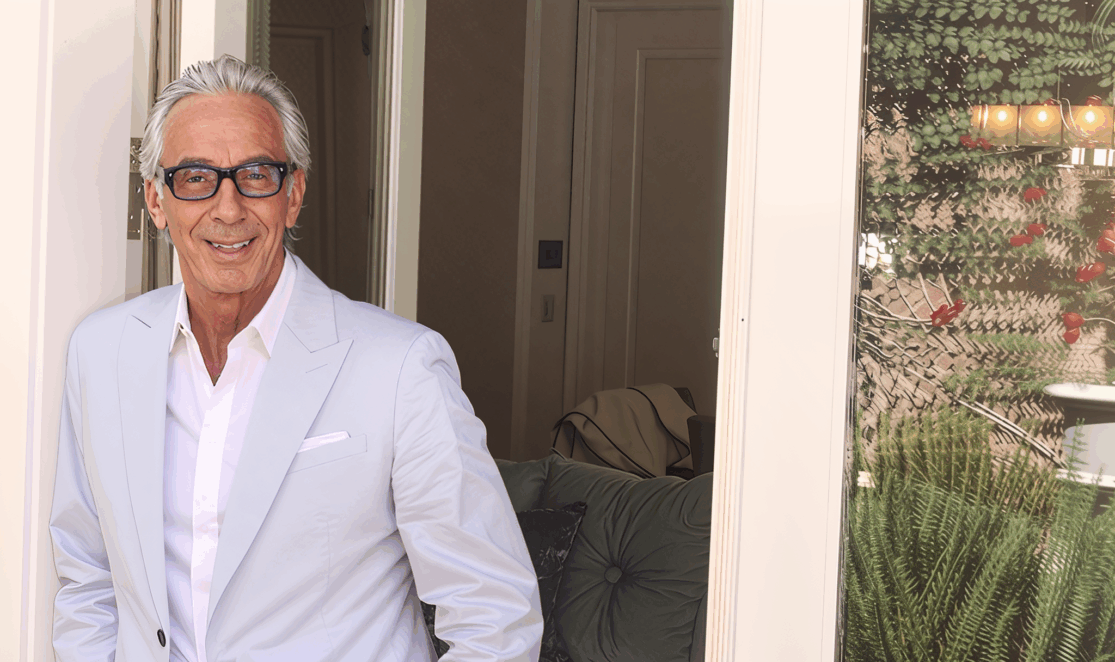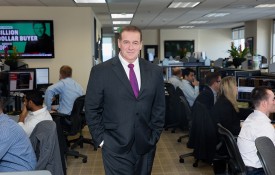Edward Mady’s leadership philosophy is renowned. With decades of experience stewarding luxury hotels through high-glamour milestones and high-pressure crises, Mady is known for cultivating cultures rooted in care, trust, and unwavering standards. In his new book, Honing the Human Edge: Leading with Caring, Coaching, and Accountability, Mady shares practical lessons from the frontlines of leadership and a blueprint for navigating complexity with grace. CSQ asked Mady 10 questions about presence, pressure, people—and the human edge that defines true leadership.
YOU’VE LED SOME OF THE WORLD’S MOST ICONIC HOTELS THROUGH BOTH HIGH-GLAMOUR AND HIGH-STAKES MOMENTS. WHAT PERSONAL PHILOSOPHY HAS GROUNDED YOU THROUGH IT ALL?
My Mother and Father believed in me long before I believed in myself. My father handed me the keys to my first car just so I could get to hospitality school. That single gesture gave me purpose and a reason to start moving. My parents also taught me the value of presence. Show up. Care deeply. Say less, but mean every word. And that has stayed with me. Whether I’m handling a crisis or mentoring a rising leader—I start with presence. That is the philosophy that has grounded me and inspired me to write about Humanistic Leadership. I wrote this book for people who want to lead through pressure, not just survive it. I’ve faced pressure personally and professionally, and I learned that the difference is how you show up for others.

“CREATING A CULTURE OF WELCOME” SOUNDS SIMPLE BUT IT REQUIRES INTENTION. WHAT ARE SOME OF THE UNSEEN SYSTEMS OR HABITS THAT BRING THAT CULTURE TO LIFE?
Culture is the quiet voice in the room that says, ‘This is how we do things around here.’ It’s what keeps standards high when no one’s watching. And the beautiful thing is—it doesn’t have to be loud. In fact, the strongest cultures are often the softest forces. They shape behavior. They build trust. In short, culture turns the standards which a team learns in training into actionable instincts. When this happens, you don’t have to remind people to personalize a hotel welcome or go the extra mile; it’s already in their bones. In great hotels, providing a genuine spirit of welcome quickly becomes muscle memory. It doesn’t leave a person. That’s why great hotel employees can be so valuable in other public-facing businesses. They’re hospitable no matter where they end up.
Fellowship also matters – Celebrate birthdays, anniversaries, and small wins for the team. I instituted a Quarter Century Club at several hotels so we could celebrate the dedication of long-term team members. In fact, to drive home everyone’s purpose and value- during my tenure at an iconic hotel in Beverly Hills, we redecorated the employee entrance with a red carpet and a whole VIP arrival experience to deliver the sense of welcome we provided for our guests, from heads of state on down. The pride of our team members was palpable.
IN HONING THE HUMAN EDGE, YOU TALK ABOUT “LEADING WITH CARING, COACHING, AND ACCOUNTABILITY.” HOW DO YOU STRIKE THAT BALANCE—ESPECIALLY WHEN MANAGING ACROSS FOUR GENERATIONS IN THE WORKPLACE?
Culture transcends generations, because the human heart doesn’t change, nor does the value of collaboration. Regardless of generations, it’s imperative to respect and recognize everyone’s contributions, from a valet who has been with a hotel for 30 years to a new hotshot MBA. Ensuring everyone understands and deeply embraces a shared service culture is what’s key.

YOU’VE SAID THAT LEADERSHIP MAKES YOU “THE CUSTODIAN OF A REPUTATION AND A CULTURE.” HOW DOES THAT RESPONSIBILITY SHIFT DURING A CRISIS, AND WHAT’S THE #1 MISTAKE LEADERS TEND TO MAKE IN THOSE MOMENTS?
The number 1 mistake leaders tend to make during a time of crisis is not knowing they’re in one. In a crisis, leadership doesn’t elevate you above others; it makes you responsible for others. The best crisis managers are like first responders: they plan, rehearse, and train continually before a crisis occurs, always focused on readiness and safeguarding their brand, their customers, the public, their stakeholders, and their own people. Advance crisis training is critical, as is a business’s own crisis manual – something every company should create in advance, complete with Q&As for authorities, media, and customers. And in a crisis, it really does come down to people – always.
WHAT ARE YOUR “14 WORDS ON WHAT EVERY CUSTOMER WANTS”—AND HOW DID YOU ARRIVE AT THEM?
Remember me. Recognize me. Anticipate my needs. Give me what I want on time. These fourteen words are my customer’s promise. Whether you’re in healthcare, finance, or retail, people want to feel seen, not processed. This applies to every industry because people are people, whether they’re checking into a hotel or an employee starting their shift. This is essentially ‘The Golden Rule of Customer Experience.’
YOU DIFFERENTIATE BETWEEN PLANNING AND STRATEGY IN YOUR LEADERSHIP APPROACH. CAN YOU EXPLAIN THAT DIFFERENCE AND WHY IT MATTERS, ESPECIALLY IN HOSPITALITY?
Differentiation is important here. Planning is not a strategy. Planning is a comfortable, often measurable to-do list with tasks, deadlines, and controllables. Strategy is a whole different beast. Strategy is how you will win. It is less comfortable, harder to create, and requires predicting the future, much more so than planning. It lays out the route and navigational tools to reach your business’s ultimate destination and has one, and only one—objective: to win by maximizing your potential business value.

YOUR BOOK OFFERS BEHIND-THE-SCENES ANECDOTES FROM SOME OF HOSPITALITY’S MOST HIGH-PRESSURE SITUATIONS. IS THERE ONE STORY THAT BEST ILLUSTRATES YOUR LEADERSHIP ETHOS IN ACTION?
Celebrity scandals and disorderly guests are 24/7 occurrences in hotels, as are the greater challenges of money shortfalls, power outages, natural disasters, social media onslaughts, picket lines, lawsuits, employee shortages, data breaches, and more. I’ve been there, and I’ve learned that “zip it,” “focus, focus, focus,” and “do the right thing” are the mottos that usually work.
One example stands out for me: What would you do if you were canceled, if you suddenly became a pariah? I experienced this with a large contingent of employees in New York (including some direct reports) who walked out after I fired a dishonest manager.
The manager had been their friend. To defend myself, I would have had to share what I knew about his malfeasance, but we signed non-disclosure agreements at the time of his termination, so I had no choice but to zip it, focus, and do the next right thing. And in the process, I lost a few employees I did not want to lose. But after all was said and done, enough stayed, I recruited even stronger talent, and the team became more synchronized.
IN AN INDUSTRY DRIVEN BY IMAGE, HOW DO YOU NAVIGATE THE TENSION BETWEEN PUBLIC PERCEPTION AND PRIVATE RESPONSIBILITY, ESPECIALLY WHEN DEALING WITH CELEBRITY GUESTS OR SENSITIVE SITUATIONS?
Guest confidentiality is sacrosanct in hospitality, and hoteliers therefore do not owe guests’ private information to the public. You know all those patient privacy protections provided by HIPAA? In hospitality, we abide by our own unspoken oath to protect guests’ privacy.
I can say, though, that for some ultra-high net worth individuals, compromise is not an option (this can really apply to any customer, though). That’s okay, because juggling customer expectations and experiences is our daily task, and, in the case of luxury hotels, we can not compromise on delivering a less-than-perfect stay. This means even a great stay is not the goal in my mind, I’d always rather deliver a once-in-a-lifetime stay that will become a core memory.
YOU WRITE THAT KINDNESS SHOULD NEVER BE CONFUSED WITH WEAKNESS. HOW DO YOU CULTIVATE FIRM YET COMPASSIONATE LEADERSHIP IN AN INDUSTRY THAT OFTEN DEMANDS BOTH URGENCY AND GRACE?
You can never be too nice or too kind, as long as you remember what the workplace guardrails are for this – and what the framework is for creating and protecting your business’s value at the same time. Here’s an example: A newly hired hotel page once asked me if he could bring a personal water flask to work to stay hydrated. I said yes and then later learned that it had been damaged when someone mugged him after hours. I also learned that he was interested in career growth but was afraid to mention it to his superiors, wary of jeopardizing the work schedule that allowed him to sell street food with his mother on weekends to support their extended family.
At the end of his day-90 new-employee probation, I left a personalized flask with his name on it for him and then arranged it so that he could assist and learn to be a front desk agent while maintaining his set weekday hours as a page. Not too long afterward, he was promoted to be a weekday guest relations coordinator – a growth opportunity that would allow him to continue to support his relatives with outside family work on Saturdays and Sundays.
LOOKING AHEAD, WHAT LEADERSHIP SKILL DO YOU BELIEVE WILL BE MOST ESSENTIAL FOR THE NEXT GENERATION OF HOTELIERS—AND WHAT ADVICE WOULD YOU GIVE THEM?
One important skill will be the ability to lead a hotel humanistically while further embracing the value of AI and related advances. This means that hotel leaders will need to speak the same technological language as the young digital natives who comprise their teams. I am also excited about tech breakthroughs that actually allow us to be more, rather than less, humanistic. New tracking metrics and algorithms can help us discover not just what guests are saying, but what they are not saying. What customers are not saying to you as a leader is a tremendous piece of knowledge to have. Some third-party providers can capture this data in a very short time, based on foot traffic, social media verbatims, unspoken comments, and more. Essentially, we can use machine learning (ML) to track and evaluate what people’s human behaviors indicate, despite what they may or may not be telling us personally. This will become increasingly helpful to hoteliers, as long as we can remember that advances like AI can still not replace the welcome of a human smile and warm handshake.
Honing the Human Edge is available to order here.













































